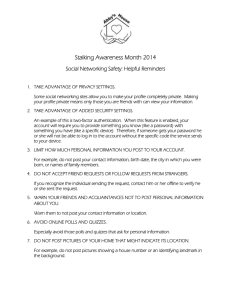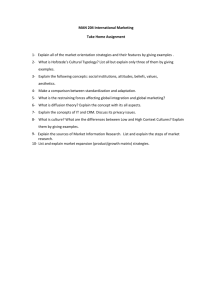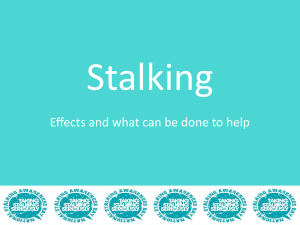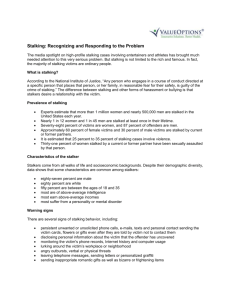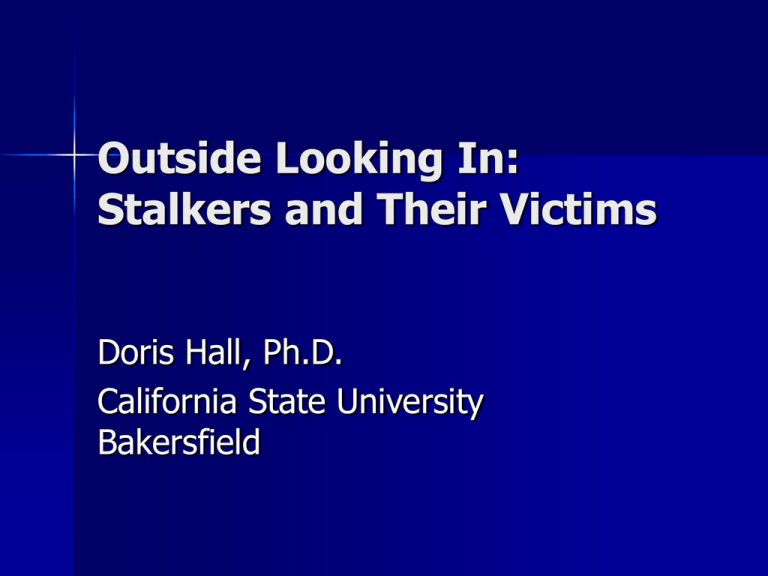
Outside Looking In:
Stalkers and Their Victims
Doris Hall, Ph.D.
California State University
Bakersfield
Stalking (CA P.C. 646.9)
Willfully, maliciously and repeatedly
follows or harasses another person,
Who makes a credible threat
With the intent to place that person in
fear for their safety or the safety of
their immediate family
Typology of Stalking Victims
Stalking Victims
Prior
Acquaintance
35%
Stranger
6%
Unknown
3%
Post Intimate
56%
Post Intimate
Prior Acquaintance
Stranger
Unknown
Post Intimate
Ex-Husbands
Ex-wives
Ex-boyfriends
Ex-girlfriends
Prior Acquaintances
Acquaintances
Neighbors
Former friends
Co-workers
Students
Ex-patients
Relatives
Rapists
Unknown
Early on in a stalking situation
You know someone is following and/or
harassing
But you do not know who it is (yet)
Most stalkers will let victim know who
they are
False Victimization (FV)
Very rare (2%)
Usually females
Turns out the victim is actually the
perpetrator
Attention seeking behavior
FVS Red Flags
Come forward gleefully
Wants to share all the details
Expresses little fright
Seems to be enjoying the attention
Encourages police/3rd parties to set up
a “meeting” so they can talk to stalker
FVS Red Flags
Many FVS have history of self
mutilation
Suicide attempts
False claims often follow major life
distressors or dramatic moments
Stalker Contact
Surveillance Techniques
Following
Drive bys
Appearing at workplace
Wiretap telephones
Home surveillance
Stalker Contact
Harassment
Letters
Phone calls
Threats
Unwanted gifts
Mail tampering
Cancel utilities
False police reports
Stalker Contact
Property Damage
Slashed tires
Broken windshields
Poison outdoor plants
Cut up clothing
Break into home
Stalker Contact
Violence
Occurs in 30% of cases
Physical assault
Sexual assault
Kidnapping
Killing or injuring pets
Protective Orders
Of the 44% of the respondents who
obtained a restraining order
20% rated them as effective in
controlling stalking behavior
80% rated them as ineffective
Restraining Orders
Two schools of thought:
Yes, always get one
versus
Maybe, it depends on the situation
Restraining orders (cont).
“Law Enforcement Tools”
If a restraining order is violated it
becomes a felony versus a
misdemeanor.
Castle Rock v. Gonzales
(2005)
U.S. Supreme Court decision (7-2)
held that respondent’s 14th
amendment Due Process Clause was
not violated by failure of police to
enforce restraining order against her
estranged husband
Tragic case in Colorado.
Dramatic Moments
life events which are likely to humiliate or
shame to perpetrator, stoke his fury, and
increase his risk of violence.
Examples include but are not limited to:
stalkers first approach to and rejection by
the target
Unacknowledged gifts, letters, etc.
Issuance of restraining order
First court appearance
Tjaden findings
1 in 12 females will be stalked during
their lifetime (8-12% of population)
1 in 45 men will be stalked during
their lifetime (2-4% of population)
Australia
15% of the population will be stalked
sometime during their lifetime
Australia has a less stringent definition
of stalking than the U.S.
U.S. College students
1.
2.
Several studies have found that
approximately 27% of college
students are stalked during their
college years
Possible reasons for this finding
Developmental deficits in social skills
Structure of college life
Routine Activities Theory
Three elements:
Motivated offender
Suitable target
Lack of capable guardianship
Stalkers
When compared to other criminals,
stalkers tend to be:
Older
Higher IQ
More educated
Demographic
Characteristics of Stalkers
Male (75%-87%)
Mid to late 30s
Average or above average intellectual
functioning
High School or above educational
attainment
History of failed intimate relationships
Immigration may be a risk factor (10%)
Prior psychiatric history
Zona’s Typology
Erotomania
AKA Old Maid’s Syndrome
Delusional belief that another person,
usually of a higher status, is in love
with them
Zona’s Typology
Erotomania
Subtype: Male Erotomanic
Usually from countries where the
genders are kept separate.
Example Tarasoff v. U.C. Berkeley
Zona’s Typology
Erotomania
Athena Rolando broke into Brad Pitts
home
Wore his clothes, slept in his bed, fed
his dogs
What did she get?
Zona’s Typology
Athena
Two days in jail
36 months probation
15 days graffiti removal
3 years psychological counseling
100 yards restraining order
And….
Zona’s Typology
Athena (continued)
A guest on the Leeza Gibbons Show
Howard Stern Show
And Inside Edition
Zona’s Typology
Love Obessional
Person knows that the other person is
not in love with them…yet…
Example John Hinckley, Jr.’s obsession
with Jodie Foster
This type of stalker might be the one
that flattens your tire and then offers
to fix it.
Zona’s Typology
Simple Obsession
Basically everyone else.
Includes all
Stalker Typology
Boone & Sheridan
A law enforcement perspective
Developed by a profiler in England
N=124
Four types
Boone & Sheridan
Expartner
Harassment/Stalking
50%
Overt threats
Hostile
Recruits family & friends
High risk for violence
Victim should avoid perpetrator
May want to consider relocating
Boone & Sheridan
Infatuation Harassment
19%
Target is “beloved”
Non-malicious ruses
Low levels of danger
Perpetrator in teens to mid-life
Police need to be sympathetic, but
explain victim is not interested
Boone & Sheridan
Sadistic Stalker
13%
Victim seen as prey
Initially low level acquaintance
Communications blend of love and threats
Take very seriously
Very difficult to stop this stalker
Do not give victim false hope
Victim should move to secret location &
change identity
Boone & Sheridan
Delusional Fixation Stalking
15%
Incoherent, yet fixated
High risk for physical and/or sexual violence
Borderline personality
Not responsive to rejection
Protective orders do not deter
Refer to forensic psychologist
Mullen & Pathe Typology
Rejected
Desire for reconciliation
Stalking is substitute for lost
relationship
Very intrusive & persistent
Mullen & Pathe Typology
Intimacy Seeker
Object is their true love
Star stalkers
Mullen & Pathe Typology
Incompetent
Intellectually limited
Short duration
Serial stalker
Mullen & Pathe Typology
Resentful
Aggrieved workers
Feels humiliated
Vendetta for specific person
Mullen & Pathe Typology
Predatory
Exclusively male
Physical and sexual assault
Often serial killers
Spitzberg’s Obsession
Relational Intrusion
Repeated and unwanted pursuit and
invasion of one’s sense of physical or
symbolic privacy by another person,
either stranger or acquaintance, who
desires and/or presumes an intimate
relationship
Spitzberg’s ORI
Even mild forms are viewed as
moderately threatening
Behaviors are on a continuum
At some point they can cross over into
stalking behavior
Discusses the “Gray Area” of when
behavior becomes stalking
Spitzberg’s ORI
Four different motives
“Lovers” seek to care for and cherish target
“Haters” seek to harm, scare, intimidate,
destroy or seek revenge
“Controllers” seek to plan, manipulate and
contain or restrain
“Expressers” display their feelings and inner
urges as they occur without cognitive
editing
Conviction rate of
stalkers
Approximately 50% of stalking victims
report the crime to the police
13% of female victims report conviction of
stalker versus 9% of male victims
If you include other crimes committed by
stalker (but not the actual crime of stalking)
conviction rates increase to:
24% for female victims and 19% for male
victims
DeBecker’s JACA
JACA is a prediction about violence
Justification for violence
Alternatives to violence
Consequences of violence
Ability to follow through on the
violence
Risk Management
Critical part of risk management is
frequent and effective communication.
If the police or employer takes action
which might anger or embarrass the
stalker
Target needs to be advised or the
stalking victim is put at further risk
Red flags (continued)
ingratiation with the target’s coworkers or family members
Chronic lying or excuse making
Repeat questioning about how the
target spends time and with whom
Stalking Red Flags
Chronic privacy intrusions at work or
at home
A need for the stalker to be physically
close and to frequently touch the
target
Prolonged staring at the target without
verbalization
Repeat and unwanted gift giving
DeBecker says:
“No matter what you may have
assumed till now, and no matter for
what reason you assumed it, I have no
romantic interest in you whatsoever. I
never will. I expect that knowing this,
you’ll put your attention elsewhere,
which I understand, because that is
what I intend to do.”
Psychosocial Impact on
Stalking Victims
Anxiety (83%)
Sleep disturbances (74%)
Overwhelming Powerlessness (75%)
Flashbacks/Intrusive recollections (55%)
Fatigue (55%)
Weight fluctuation (48%)
Headaches (47%)
Reduced social outings (70%)
Reduction in work/school attendance (53%)
Relocation (39%)
Change in workplace, school, or career (37%)
Risk Management
Strategies for Victims
Document, document, document
Maintain log of all contact
Change daily schedule and routes
Alert trusted neighbors, coworkers, family
and friends
Cease all contact with stalker
Code word on all utilities
Have a safety plan
Carry a disposal camera and a video camera

